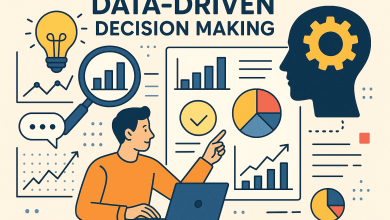Introduction
Aging is a complex biological process involving metabolic, hormonal, and musculoskeletal changes. Modern medicine increasingly relies on Big Data and Artificial Intelligence (AI) to understand aging, predict health risks, and personalize interventions to improve longevity and quality of life.
Pharmacological compounds such as Anavar (Oxandrolone) and MK-677 (Ibutamoren) play a significant role in supporting muscle maintenance, metabolism, and hormone regulation in aging populations. Leveraging predictive analytics and real-world data allows clinicians to optimize these therapies while monitoring safety. This article explores how Big Data and AI are reshaping aging and longevity medicine.
1. The Role of Big Data in Aging Medicine
Aging medicine involves the integration of vast datasets:
- Clinical data: Medical histories, chronic disease management, lab results
- Genomic and epigenetic data: Understanding age-related genetic and epigenetic changes
- Wearable and lifestyle data: Physical activity, sleep patterns, nutrition, and metabolic monitoring
- Pharmacological data: Longitudinal tracking of therapy outcomes, including anabolic and hormone-modulating drugs
AI and Big Data analytics provide insights into individual aging trajectories, allowing clinicians to anticipate health risks and design targeted interventions.
2. Predictive Modeling for Healthy Aging
Predictive analytics enables clinicians to:
- Forecast risk of sarcopenia, frailty, and metabolic disorders
- Identify patients likely to benefit from anabolic or hormone-enhancing therapies
- Predict response to rehabilitation and lifestyle interventions
By applying AI models, aging medicine shifts from reactive treatment to proactive prevention and personalized therapy planning.
3. Anavar (Oxandrolone) in Aging Medicine
Anavar, a mild anabolic steroid, supports lean muscle mass, strength, and metabolic function—key factors in healthy aging.
Big Data applications include:
- Predictive response modeling: AI analyzes patient-specific factors such as age, liver function, and comorbidities to forecast therapeutic outcomes
- Safety monitoring: Aggregating real-world evidence for early detection of adverse effects like liver strain, lipid alterations, or hormonal imbalances
- Optimized dosing strategies: Machine learning tailors therapy for maximal benefit and minimal risk
Anavar helps mitigate age-related muscle loss, improve recovery, and maintain functional independence.
4. MK-677 (Ibutamoren) and Hormonal Support in Aging
MK-677 stimulates GH and IGF-1 secretion, supporting muscle maintenance, metabolism, and bone health in older adults.
Big Data and AI applications include:
- Longitudinal monitoring: Tracking hormonal, metabolic, and body composition changes
- Predictive simulations: Modeling individualized responses to therapy
- Adverse effect prevention: Early detection of potential insulin resistance or fluid retention
These insights allow clinicians to safely incorporate MK-677 into aging-focused interventions.
5. Personalized Longevity Programs
Personalized aging interventions integrate:
- Genetic and epigenetic profiles
- Hormonal and metabolic status
- Lifestyle factors such as diet, exercise, and sleep
AI combines these variables to create individualized programs, integrating pharmacological support (Anavar or MK-677) with lifestyle optimization for healthy aging.
6. Wearables and Continuous Monitoring in Aging Populations
Wearable devices provide continuous data critical to aging medicine:
- Activity tracking to monitor physical function and fall risk
- Sleep and circadian rhythm analysis for hormonal health
- Metabolic monitoring for early detection of glucose dysregulation
Continuous data feeds predictive models, enabling proactive interventions to maintain independence and functional capacity in older adults.
7. Digital Twins in Aging and Longevity Medicine
Digital twins allow clinicians to simulate individual aging trajectories, including response to anabolic or hormone-enhancing therapies:
- Predicting outcomes of interventions like Anavar and MK-677
- Simulating long-term effects on muscle, metabolism, and bone health
- Optimizing personalized treatment strategies without risk to the patient
Digital twins enhance safety and efficacy while improving precision in aging interventions.
8. AI-Enhanced Clinical Trials in Longevity Medicine
Clinical trials targeting aging populations face challenges: heterogeneity, comorbidities, and slow response timelines. AI and Big Data improve trial efficiency by:
- Selecting participants likely to benefit from therapies
- Continuously monitoring outcomes for adaptive trial design
- Detecting adverse events early to maintain safety
For compounds like Anavar and MK-677, AI-driven trials generate robust evidence for safe and effective use in aging medicine.
9. Ethical and Regulatory Considerations in Aging Therapies
Aging medicine must address ethical and regulatory issues:
- Protecting patient data privacy under HIPAA and GDPR
- Ensuring transparency and fairness in AI predictions
- Avoiding bias that could compromise care in older or vulnerable populations
Responsible oversight ensures that therapies like Anavar and MK-677 are applied safely and ethically in longevity interventions.
10. The Future of Aging and Longevity Medicine
The integration of Big Data and AI in aging medicine is paving the way for:
- Predictive interventions that prevent frailty and sarcopenia
- Personalized pharmacological, nutritional, and exercise regimens
- Digital twin simulations for safe experimentation with anabolic and GH-modulating therapies
- Global insights into healthy aging trends and population-level strategies
Anavar and MK-677 exemplify how data-driven medicine can enhance longevity, support muscle and metabolic health, and maintain quality of life in aging populations.
Conclusion
Big Data and AI are transforming aging and longevity medicine, enabling predictive, personalized, and safe interventions. By integrating clinical, genetic, wearable, and pharmacological data, clinicians can anticipate health risks, optimize therapy, and monitor outcomes in real-time.
Pharmacological agents such as Anavar Kopen (Oxandrolone) and MK-677 (Ibutamoren) illustrate the benefits of data-driven medicine. Predictive modeling, continuous monitoring, and digital twin simulations ensure safe and effective application, supporting healthy aging and improved quality of life.
The future of longevity medicine is proactive, precise, and personalized, with Big Data and AI at its core.






